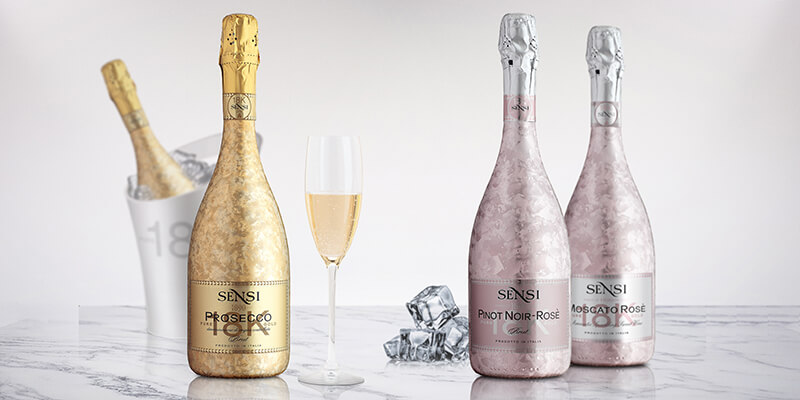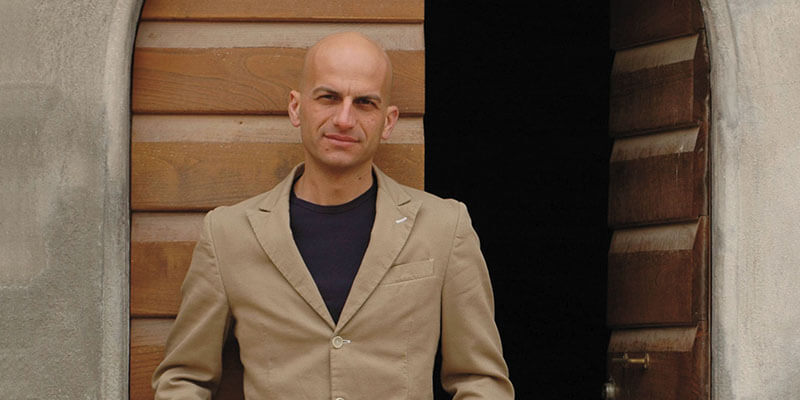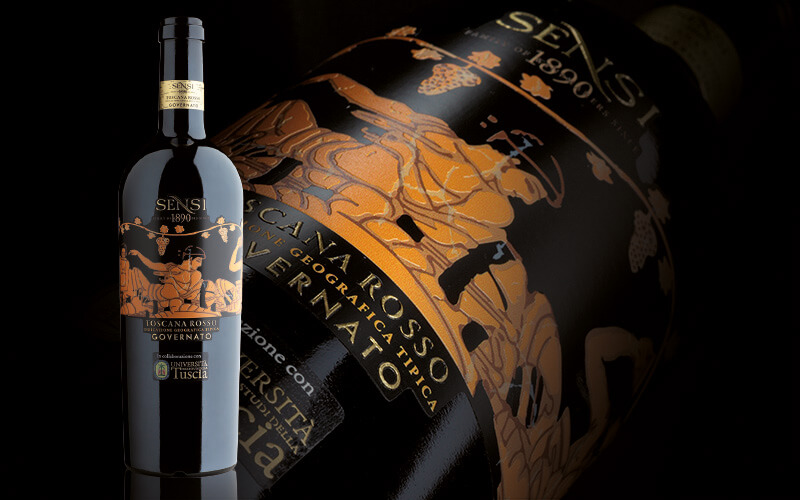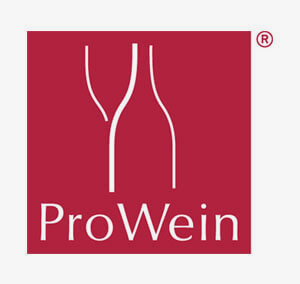Sensi Today
Newsletter n°08
NEW SPARKLE LINE
18K
Wine is not just wine. It’s like you. This is the motto of the new sparkle line, with recent restyling by Sensi. Exuberant in its look and strong in its personality to interpret glamor and lifestyle, for a modern and vital lifestyle.
“I would say that we started this adventure because, in tune with my passion for glam-rock I wanted to develop a wine that could create a new interest, not tied to the traditional notions of denomination/territory/vine, trying to approach wine consumers in a more transversal way, with references to music, fashion and transgression”.
18k Prosecco – Prosecco Treviso Doc
Glera 100%. Clean and elegant to the nose, with pleasant hints of fruit, pears, apples, and aromatic herbs. At the palate it has verve and freshness, fine bubbles and good body. It closes with a fruity and enveloping finish.
18k Pinot Noir Rosé
Pinot noir 100%. Beautiful antique pink color. Elegant to the nose, with pleasant floral notes that return to the palate together with pleasant freshness, good body and great balance.
www.sensiluxurywines.com

INTERVIEW TO MASSIMO SENSI
Interview to Massimo Sensi – The Green wines
Sensi’s “Green” line is born from an approach towards eco-sustainability, awareness, energy savings and environmental impact. Three red wines created with the intent of respecting the environment and going back to our roots. This is how the organic Chianti Campoluce, Ninfato, without added sulphites, and Chianti Superiore Vegante, vegan certified are born.
How did you get the idea to follow the “green” path for your wines?
There are several reasons why I chose to undertake a “green” path:
First of all, I followed my personal desire to return to our roots. As any company of tradition worthy of such name, looking at the past helps to recover important information at times forgotten. One of the main things that one learns, for example, is that agricultural products, and wine among them, were created from cultivations without the use of pesticides, sulphites and other substances used to protect the ripening of the fruit and bottled product. Even without them, it was possible to introduce high quality wines.
Then, my decision is based on greater respect for the environment. Even if the environment is affected by other sources of pollution, there’s no doubt that setting a good example is, first of all, a fact that leads to a domino effect, which, then, thanks to modern communication, can definitely and positively change global awareness, giving life to a virtuous circle.
Finally, I felt the need to reduce the presence of allergens in the final product: allergies in the modern world are on the rise and this is also due to nutrition. Thus, to help people who suffer from the specific intolerance to SO2, for example, this approach is an important achievement and a starting point for food quality and wellness.
What are the characteristics of the company’s three green wines?
Campoluce is made with grapes grown without pesticides and its name derives from “light in the fields”, meaning attention to nature, but also the presence of fireflies in the field, that demonstrates the purity of the environment.
Ninfato is produced with Sangiovese grapes from selected clones in our vineyard and fermented at controlled temperatures even during the next phases without the addition of sulphites. Its name derives from Ninfa del Corbezolo, a rare species of butterfly that inhabits Tuscany and is able to suck the juice from the vineyard grapes, highlighting the purity of the grapes.
Vegante, certified vegan, is created without using any fining agents that derive from fish gelatin, egg white, and of course this is what gives it its name.
But what does vegan wine mean exactly?
Vegan certified wines do not use substances of animal origin for example casein and albumin which are usually used in traditional wine making. Vegante is born from my curiosity towards food philosophies that have developed their own identity over the past two decades. The Vegan philosophy is increasingly more popular and embraced by a growing number of consumers that, despite often very personal interpretations, demonstrate an increasing attention not only to the quality of taste, but the ethics of the product.

GOVERNATO
The drying process at the Sensi company
An interview to Professor Fabio Mencarelli
Professor of Oenology at the University of Tuscia, Department for the Innovation of Biological, Agrifood and Forestry Systems, degree course in Food and Wine-making Technologies, specialization in Vine-growing and Oenology, manager of the winery and experimental vineyard, for years known as the leading international expert in the grape dehydration technology in wine production.
How did the idea and decision to dry grapes come to light?
This was the direction that we decided to take to produce a Governo wine produced with care to achieve excellence. We didn’t say: let’s dry the grapes, then let’s make the wine and see what happens. We are in the land of Galileo; thus, we had to adopt the inductive method: we asked ourselves, we questioned ourselves: where could we place the grapes so that they can lose water without deteriorating? In which building? How should this building be made? Where should the windows be located? Should we place the grapes on crates, on trellis or hanging? Do we adopt the technology in full or do we respect the tradition but do so rationally and with careful monitoring?
And how did you go about it?
We selected a traditional building, a “fruttaia” (fruit cellar) and we decided to place the grapes hanging paying particular attention to closing and opening the windows and the use of fans. We performed continuous monitoring of temperature, relative humidity and air flow speed, always hoping that the weather would help us in this beautiful adventure.
At what stage are you?
As they say in English: it’s a work in progress. For now, we just got started, but with the intention to improve in the management of the dehydration to modulate the synthesis of compounds of interest for the wine. Even in wine-making we decided to take a daring approach. In the traditional system, and in the one we will actually use, dried grapes are added to the starting wine. However, we were curious to try a different approach, working with carefully dried grapes: pressing the grapes and adding the must of the dried grapes to the starting wine or again producing the dry wine from the dried grapes, to be combined with the starting wine. It’s a work in progress.
Finally, the ageing of the wine…
It would have been too simple to use only barriques, so, since we love to challenge ourselves, with the support of a wine-expert, Mr. Landi, we decided to try ageing in clay jars to measure their permeability, understanding their effect on phenolic compounds and on wine aromas, already quite complex since it is a GOVERNATO. We wanted to find out more, given that the scientific literature of reference lacked information. It’s a work in progress. By now, we’re in the midst of this “game”, but it is a rational one, a well thought out one, a chess game between ourselves and the grapes and then the wine. We hope to be the ones who will say: “checkmate”.

APPOINTMENTS OF THE MONTH
ProWein 2018
Sensi will be exhibiting at Prowein 2018 we will be pleased to introduce to all visitors the wines who are making them ambassadors of the elengance in the world. We are pleased to to welcome you at Hall 16 Stand / B55, from 18th to 20th March.

Browse our wines
NEWSLETTER
ニュースレターを購読する
Sensi Todayは、Sensiのニュースレターであり、イベント、アクティビティ、およびSensiの世界に関連するすべての情報を常に最新の状態に保ちます。 今すぐ購読してください!


